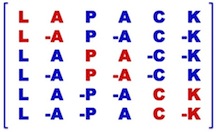 |
LAPACK 3.3.1
Linear Algebra PACKage
|
 |
LAPACK 3.3.1
Linear Algebra PACKage
|
00001 SUBROUTINE CGERQ2( M, N, A, LDA, TAU, WORK, INFO ) 00002 * 00003 * -- LAPACK routine (version 3.3.1) -- 00004 * -- LAPACK is a software package provided by Univ. of Tennessee, -- 00005 * -- Univ. of California Berkeley, Univ. of Colorado Denver and NAG Ltd..-- 00006 * -- April 2011 -- 00007 * 00008 * .. Scalar Arguments .. 00009 INTEGER INFO, LDA, M, N 00010 * .. 00011 * .. Array Arguments .. 00012 COMPLEX A( LDA, * ), TAU( * ), WORK( * ) 00013 * .. 00014 * 00015 * Purpose 00016 * ======= 00017 * 00018 * CGERQ2 computes an RQ factorization of a complex m by n matrix A: 00019 * A = R * Q. 00020 * 00021 * Arguments 00022 * ========= 00023 * 00024 * M (input) INTEGER 00025 * The number of rows of the matrix A. M >= 0. 00026 * 00027 * N (input) INTEGER 00028 * The number of columns of the matrix A. N >= 0. 00029 * 00030 * A (input/output) COMPLEX array, dimension (LDA,N) 00031 * On entry, the m by n matrix A. 00032 * On exit, if m <= n, the upper triangle of the subarray 00033 * A(1:m,n-m+1:n) contains the m by m upper triangular matrix R; 00034 * if m >= n, the elements on and above the (m-n)-th subdiagonal 00035 * contain the m by n upper trapezoidal matrix R; the remaining 00036 * elements, with the array TAU, represent the unitary matrix 00037 * Q as a product of elementary reflectors (see Further 00038 * Details). 00039 * 00040 * LDA (input) INTEGER 00041 * The leading dimension of the array A. LDA >= max(1,M). 00042 * 00043 * TAU (output) COMPLEX array, dimension (min(M,N)) 00044 * The scalar factors of the elementary reflectors (see Further 00045 * Details). 00046 * 00047 * WORK (workspace) COMPLEX array, dimension (M) 00048 * 00049 * INFO (output) INTEGER 00050 * = 0: successful exit 00051 * < 0: if INFO = -i, the i-th argument had an illegal value 00052 * 00053 * Further Details 00054 * =============== 00055 * 00056 * The matrix Q is represented as a product of elementary reflectors 00057 * 00058 * Q = H(1)**H H(2)**H . . . H(k)**H, where k = min(m,n). 00059 * 00060 * Each H(i) has the form 00061 * 00062 * H(i) = I - tau * v * v**H 00063 * 00064 * where tau is a complex scalar, and v is a complex vector with 00065 * v(n-k+i+1:n) = 0 and v(n-k+i) = 1; conjg(v(1:n-k+i-1)) is stored on 00066 * exit in A(m-k+i,1:n-k+i-1), and tau in TAU(i). 00067 * 00068 * ===================================================================== 00069 * 00070 * .. Parameters .. 00071 COMPLEX ONE 00072 PARAMETER ( ONE = ( 1.0E+0, 0.0E+0 ) ) 00073 * .. 00074 * .. Local Scalars .. 00075 INTEGER I, K 00076 COMPLEX ALPHA 00077 * .. 00078 * .. External Subroutines .. 00079 EXTERNAL CLACGV, CLARF, CLARFG, XERBLA 00080 * .. 00081 * .. Intrinsic Functions .. 00082 INTRINSIC MAX, MIN 00083 * .. 00084 * .. Executable Statements .. 00085 * 00086 * Test the input arguments 00087 * 00088 INFO = 0 00089 IF( M.LT.0 ) THEN 00090 INFO = -1 00091 ELSE IF( N.LT.0 ) THEN 00092 INFO = -2 00093 ELSE IF( LDA.LT.MAX( 1, M ) ) THEN 00094 INFO = -4 00095 END IF 00096 IF( INFO.NE.0 ) THEN 00097 CALL XERBLA( 'CGERQ2', -INFO ) 00098 RETURN 00099 END IF 00100 * 00101 K = MIN( M, N ) 00102 * 00103 DO 10 I = K, 1, -1 00104 * 00105 * Generate elementary reflector H(i) to annihilate 00106 * A(m-k+i,1:n-k+i-1) 00107 * 00108 CALL CLACGV( N-K+I, A( M-K+I, 1 ), LDA ) 00109 ALPHA = A( M-K+I, N-K+I ) 00110 CALL CLARFG( N-K+I, ALPHA, A( M-K+I, 1 ), LDA, 00111 $ TAU( I ) ) 00112 * 00113 * Apply H(i) to A(1:m-k+i-1,1:n-k+i) from the right 00114 * 00115 A( M-K+I, N-K+I ) = ONE 00116 CALL CLARF( 'Right', M-K+I-1, N-K+I, A( M-K+I, 1 ), LDA, 00117 $ TAU( I ), A, LDA, WORK ) 00118 A( M-K+I, N-K+I ) = ALPHA 00119 CALL CLACGV( N-K+I-1, A( M-K+I, 1 ), LDA ) 00120 10 CONTINUE 00121 RETURN 00122 * 00123 * End of CGERQ2 00124 * 00125 END